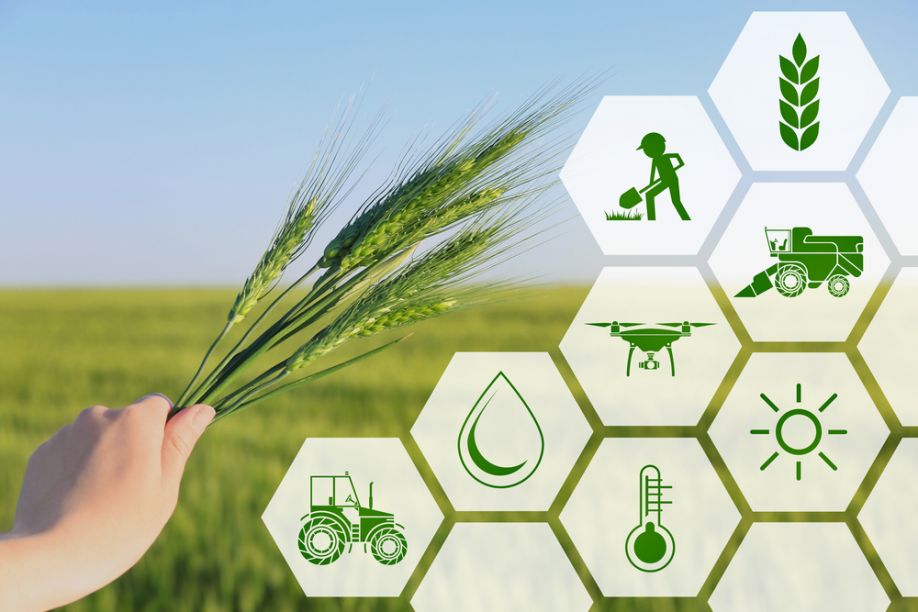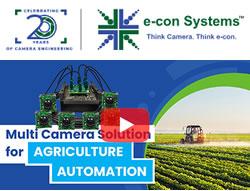The World of Future Farming and Artificial Intelligence

When you think of artificial intelligence (AI), chances are the first images that spring to mind are of gleaming tech headquarters populating the heart of Silicon Valley. Or perhaps you imagine state-of-the-art navigation and defense systems outfitting U.S. aircraft carriers and submarines.
It’s unlikely, though, that references to AI will conjure visions of sprawling fields replete with healthy crops, livestock grazing on emerald pastures, and expansive storehouses containing enormous yields of fresh fruit, vegetable, and dairy, all fresh from the farm.
In fact, the marriage of AI and agriculture is real and it is promising. Now, more than ever, it appears that the future of farming may well lie in artificial intelligence technologies.
The Role of Agri-Tech in Modern Farming
The inexperienced might associate farming today with the pastoral images of old, with tools and technologies that have changed little over the course of centuries. They often perceive farming to be the last great refuge from the encroachment of the modern world.
Those engaged in the agricultural industry, however, understand all too well that technology and farming have always gone hand-in-hand. Indeed, agri-tech is an increasingly vital component of farming today. Through the use of AI, robotics, and other advanced technologies, farmers are better equipped than perhaps ever before to increase crop yields, reduce the risk of crop failures, and implement more sustainable practices.
How Agri-Tech Is Being Used Today
The uses of agri-tech today are nearly as varied as the farmers who deploy them. AI systems, for instance, can be used for smart farming — a process whereby the IoT is used to continuously monitor the growing environment and soil conditions, as well as to alert farmers to the presence of pests and disease
These technologies can even harness the power of machine learning to predict crop yields and define cultivation strategies that will provide the greatest return on investment while minimizing resource use.
Risk Mitigation Through Smart Farming
There is no question that farming has always been a risky endeavor. A single storm, an infestation, a disease outbreak, or even a collapse in the market can wipe out the hard work, and most of the income, for an entire season.
This risk is particularly evident today, as the effects of climate change manifest in often extreme and unpredictable weather conditions.
AI systems, however, facilitate the practice of precision agriculture, meaning that farmers are better able to pinpoint the most promising fields for specific types of crops and tailor cultivation strategies to the unique, and ever-changing, requirements of that specific location. This means that farmers will know exactly what the crop needs at any given moment, ensuring that the fields always maintain optimal levels of hydration, light, oxygen, and fertilization for the environment and variety of crop. This supports risk mitigation not only by reducing the risk of crop failures but also by minimizing resource wastage while maximizing yields.
Another area in which AI systems facilitate risk mitigation is in the tracking, monitoring, and maintenance of livestock. Satellite-based AI systems use geolocation to trace the movement and pinpoint the location of herds as well as individual stock in real-time. These systems can also be used to detect and alert ranchers to the location of a potentially sick or injured animal. This capacity to continuously oversee the entire herd and each individual in it, even when scattered over thousands of acres, can potentially save ranchers tens or even hundreds of thousands of dollars in livestock losses.
Latest Trends
There’s no question that ours is the great age of technology. This is particularly evident in the ascendancy of AI across industries, from marketing to education to commerce.
Perhaps the most significant role of AI in shaping the future of our world, however, lies in the growing sustainability trend in farming. Historically, farming practices have taken a tremendous toll on the environment. With the advent of smart farming, though, food producers can not only minimize their carbon footprint and reduce resource consumption, but they can also innovate production practices to meet vast and rapidly increasing demand.
This includes using AI-based analytics and monitoring to support farming in once untenable environments, including densely populated urban areas and even indoor spaces. As the global population continues to grow apace, this capacity to maximize food production and cultivation areas while minimizing environmental harms will meet an increasingly urgent need.
The Takeaway
Despite the idealized image of farming as the last bastion of an ancient way of life surviving in the technological age, the reality is that technology and farming have always been close allies. However, the partnership between agriculture and tech has perhaps never been more important than today. In fact, the advent of modern smart farms has seen the integration of some of the world’s most sophisticated technologies into the agriculture industry. Artificial intelligence systems, for instance, are playing a leading role in preventing crop failure, maximizing yields, and supporting sustainable practices through the use of precision agriculture.
Comments (0)
This post does not have any comments. Be the first to leave a comment below.
Featured Product

